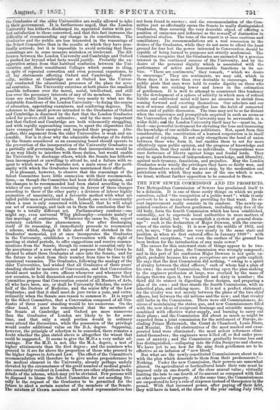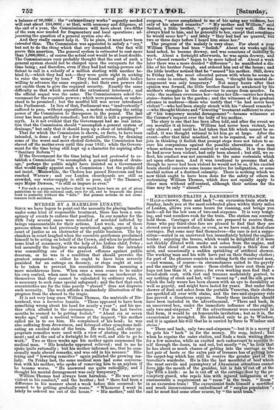The causes for this untoward state of things appear to
be two- fold. In the first place, the Commission was wrongly composed; and in this part of his confession Major Dawson is not quite ex- plicit, probably because his own perceptions are not suite explicit He says that the first Commission did nothing, " owing to a spirit of rivalry between the chief officers," each of whom had a plan of his own ; the second Commission, throwing open the plan-making to the engineer profession at large was overlaid by the mass of designs thrown upon it, two hundred and sixty in number ; the third did its utmost in digesting those designs, and preparing a plan of its own : and thus stands the fourth Commission, with an inherited plan, and nothing more. It is not a perfect statement ; for the rivalry was not merely between the plans of the two chief officers, but between.the old notions and the new; and that rivalry still lurks in the Commission. There were old Commissioners, de- sirous of maintaining the status quo, and new Commissioners filled with the new ideas of reciprocal quo, and scientific manuring, combined with effective water-supply, and burning to carry out their plans and the Commission did about as much as might be expected from a joint commission for the settlement of Europe, in- cluding Prince Metternich, the Count de Chambord, Louis Blanc, and Mazzini. The old obstructives of the most marked and exas- perated kind were eliminated; the most ardent reformers elimi- nated themselves; the engineers were killed off, or fled under pres-
sure of anxiety ; and the Commission ually became less and less distinguished,—collapsing into Sir /II:Burgoyne and chorus. We have yet to see how far the nine fresh gentlemen are to be effective as an infusion of " new blood."
But what are the newly-constituted Commissioners about to do with the plan which descends to them from their predecessors ?- Nothing. Under the new Commission, their powers are somewhat altered. On agricultural or horticultural lands their rate must be imposed only on one-fourth of the clear annual value ; virtually limiting the rate to one fourth of its amount as compared with that on other species of property. At the same time, the Commissioners are empowered to levy a rate of sixpence instead of threepence in the pound. With that increased power, after paying off their debt, they will have in baud, at the close of the year ending Ynly 1853, a balance of 96,3001.: the "extraordinary works" urgently needed will cost about 244,000/. • so that, with economy and diligence, at the end of a year, the Commissioners will have about two-fifths of the sum now needed for fragmentary and local operations ; ad- journing the question of a general system sine die. And they really cannot help it. To be plain, it must have been intended thus. The Commission was appointed to satisfy a "cry," but not to do the thing which that cry demanded. One fact will prove this assertion. The general system is estimated to cost more than 1,000,000/. ; of course the actual cost would be at least double. The Commissioners very probably thought that the cost of such a general system should not be charged upon the occupants for the time being • and therefore, even if they had had rating-powers suf- ficient to call in a subsidy of a-million sterling with another be- hind it,—which they had not,—they were quite right in seeking to raise the money by loan! They found several public bodies willing to advance the sums required ; but their own powers did not enable them to give the required security. Exactly the same -difficulty as that which arrested the extramural interment ; and the official sequel was the same. The Commissioners asked Go- vernment for the requisite powers ; which were promised, or under- stood to be promised ' • but the needful bill was never introduced into Parliament. In lien of that Parliament was "inadvertently" suffered to pass, without opposition, a motion reducing the rating power of the Commission to threepence in the pound. The last error has been partially remedied ; but the bill is still a prospective myth. Is it not evident that the Government had no real inten- tion that the Commission should "accomplish a general system of drainage," but only that it should keep up a show of intending P
That for which the Commission is shown, ex facto, to have been intended, is done • and by a few partial Palliatives, by draining some of the worst and most choked districts, the Commission has staved off the matter even until this year 1852 ; while the Govern- ment for the time being still kept up a character for aspiring after "Sanitary Reform"!
If the Government for the time being had not pretended to es- tablish a Commission "to accomplish a general system of drain- age," perhaps the public might have insisted on a Government that would really appoint such a Commission : but the public did not insist. Meanwhile, the Cholera has passed Erzeroum and has reached Warsaw ; and our London churchyards are still as crowded, our water-supply is still as poor, and " the Thames," says Major Dawson, "is still as impure as ever."
* For such a purpose, we believe that it would have been an set of pious patriotism to use the national cash, once for all, and to bequeath .the great work to posterity without the "debt." But present notions do not coun- tenance such sacrifices.



























 Previous page
Previous page